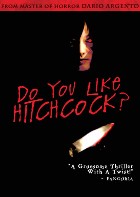
The Giallo has long courted both controversy and admiration for its fetishistic emphasis on stylized violence, graphic explicitness, sexual exploitation, and psycho-sexual characters. Most importantly, this particularly subjective form of cinematic storytelling often utilizes 'fragmented perception' as a character unto itself -- the POV through which we see the mystery unravelling -- as well as a major plot point. Perception comes up again and again as characters struggle to unravel the mysteries of their own senses to better understand crime. Specializing in convoluted plots, perverse imagery, and these offbeat characters whose shifting perceptions hold deadly secrets, Giallo evokes the physical horror of corrupted/damaged flesh while celebrating it in loving color; at the same time, it evokes emotional terrors of betrayal, the modern world's sense of alienation, and the constant threat of loss. Dario Argento, perhaps the most celebrated practitioner of this violent crime film, celebrates visual excess, weaving together the baroque and gothic into sharply edged modern horrors. Simultaneously, he defies the traditional formula of his native country's murder mysteries by paying a generous amount of attention to the story itself. While often as fragmented as the body parts he so lovingly films, and often as mad as his script's killers, Argento's narratives are surprisingly intricate, devoted to revealing the hidden layers of characters. Do You Like Hitchcock? explores the deception of appearances and the violent urges of the human animal to both create and view. It is a welcome return to the art form which he helped create and an un-refutable expansion on it. While sex, death, and voyeurism are emphasized, and Argento's interwoven sense of subversive narrative and outlandish, subjective filming style is in evidence, the story itself is richer in subtext and more complex plot-wise on than we've seen in his last few films.
In Do You Like Hitchcock? the revolutionary spirit of the Giallo's traditional violent set pieces is strengthened by a story whose inner impulses of paranoia are easily as disturbing as the external acts of debauchery used to enact confusion and rage. Amidst the creative-kill set pieces are thematic undercurrents of self identity, the illusion of appearances, and the inability of the human mind to decipher its information. What a story is about is often less important to the fan or critic of this specialized sub-genre as 'how' a film is approached. Style is more essential than subject. Not so here, in a story as thoughtful and reflective as it is nihilistic. Argento's approach both delights in and fears death. Sex and violence are fondled like a toy. The director of such iconic works as Suspiria, Deep Red, and Opera returns to the psychologically subversive thriller proper after his carefully plotted but uneven effort The Card Player to challenge both what we perceive, and how we interpret it . . . With lives and sanity on the line. Called "sly and sexy," this complex plot is both an homage to Alfred Hitchcock, the master of suspense, and a filtering of the late master's favorite themes through Argento's tastes and obsessions. As such, the work is as easily a self portrait as it is a tribute to Hitchcock. The story: Giulio (Elio Germano) is a nerdy film student; he also happens to be a lifelong voyeur (Seeing the Hitchcock references yet? Sure you are!), whose private games soon convince him that two sexy young strangers may have conspired to commit a terrifying murder. As obsession leads to life threatening danger, his fate hinges upon one question: "Do You Like Hitchcock?"
Starring Elisabetta Rocchetti, Chiara Conti and Cristina Brondo, this post-modern Giallo is a trick on sensibilities effective precisely because it gives the impression of having deceived without actually doing so. The mystery, like the horror, is inherent in the script, hidden in the film itself, so simplistic yet masterfully conceived and executed. This makes it a movie focusing on story rather than the bloodshed which is often the major concern of this sub-genre. Although Do You Like Hitchcock? is rich in dramatic potential, races along at a captivating pace, and sports beautiful cinematography, thereby connecting it with some of his best in terms of suspense, fans may well lament the lack of bloodshed and perversion that imbued his early work with such disturbing vitality. While not quite the picture fans are still hoping for -- a bold, terrifying story with as much attention paid to the violence as to the characters -- this new release by Anchor Bay is nevertheless rewarding. Co-written by Argento and Franco Ferrini, the former shows a fresh perspective. Honoring such Hitchcock classics as Strangers On A Train, Vertigo, and Rear Window, the film is most admirable for its ability to take a clever premise and make it appear organic rather than contrived. The score by Pino Donaggio echoes the various moods of the tragedy while effects by Sergio Stivaletti lends the scant physical carnage believability.
Presented in anamorphic widescreen at 1.66:1/16x9, Do You Like Hitchcock? is a pleasure to watch. Lacking grain or transference difficulties, the visuals are sumptuous, allowing the dramatic compositions and robust colors to depict a cinematic portrait occupying a shadow land between harsh realism and a lyrical Faerie Tale atmosphere. No complaints here. Audio is likewise effective, offered in clear, muffle free stereo. Extras are disappointingly sparse, including an Argento Bio and Do You Like Hitchcock? Backstage featurette that, while offering generous amounts of behind-the-scenes moments, lacks any interviews or narration to lend meaning to them. Chances are, you'll be too wrapped up in the mystery of this suspense classic to notice! A worthy film by the master of Italian horror.
Review by William P. Simmons
| Released by Anchor Bay (USA) |
| Region 1 - NTSC |
| Not Rated |
| Extras : |
| see main review |